New Year’s Eve
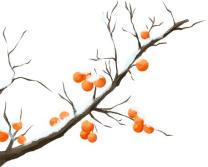
2023
Lunar calendar ● December 30th
Say goodbye to the old year with firecrackers.
Fireworks filled the sky to welcome the Spring Festival.
except
sunset
simple
interpose
In addition, that is, the meaning of removal; Evening means night, so "New Year’s Eve" means New Year’s Eve, also known as New Year’s Eve, New Year’s Eve, New Year’s Eve, etc., because it often falls on December 30 of the lunar calendar, it is also called New Year’s Eve. It is connected with the beginning and end of the new year, which is called "the end of the poor month and the end of the new year". It is the eve of the new year and an important time junction to get rid of the old and welcome the new year. The last day at the end of the year is called "year-old division", which means that the old year is divided and replaced by a new year.
New Year’s Eve is a time to get rid of the old and make new arrangements, reunite with the whole family and offer sacrifices to ancestors. Tomb-Sweeping Day, Double Ninth Festival and July 30 are traditional festivals to offer sacrifices to ancestors in China. It has special significance in the hearts of Chinese people. On the most important day at the end of this year, wanderers, no matter how far away, have to rush home to reunite with their families, say goodbye to the old year with firecrackers and welcome the new year with fireworks all over the sky.
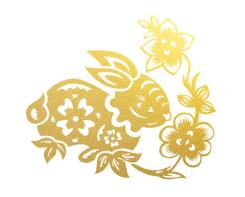
festival
sun
deep pool
source
As a festival at the end of the year, New Year’s Eve originated from the custom of getting rid of the old and spreading the new and offering sacrifices to ancestors at the end of the year in ancient times. According to "Lu’s Spring and Autumn Annals and Ji Dong Ji Ji", the ancients used drums to drive away the "ghost of plague" on the day before the New Year, and a ceremony of "mourning" was held at the end of each year. It is said that drumming to drive away the ghost of plague was also one of the customs of the New Year’s Eve festival at that time. In 2007, New Year’s Eve officially became a legal holiday in China according to the National Holidays and Remembrance Days.
Influenced by Chinese culture, New Year’s Eve is also a traditional festival for Chinese and overseas Chinese in countries with Chinese cultural circle and all over the world.
pass
unite
habit
custom
family reunion dinner on the lunar New Year’s Eve
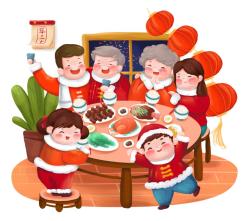
Eating New Year’s Eve is the most lively and enjoyable time for every household in the Spring Festival. On New Year’s Eve, everyone gathered around the table, and a table was filled with rich new year’s dishes, and the whole family was reunited. The feeling of warmth was beyond words.
There are many tricks of New Year’s Eve, which are different in north and south, and each has its own emphasis. For example, jiaozi is used to eating in the New Year, which has been handed down from ancient times in the north, and some coastal areas in the south, in particular, will be richer in dishes because of their geographical advantages and water resources.
When family members get together for dinner, the elderly will see their children and grandchildren, and the whole family will have a family reunion. The younger generation can also take this opportunity to express their gratitude to their parents for their parenting.
Tienianhong
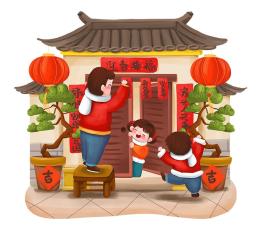
Nian Hong is a general term for the red festive elements posted during the New Year, such as Spring Festival couplets, door gods, window grilles, New Year pictures and blessings. It’s a long-standing folk custom in China to stick New Year’s greetings (waving spring), which places people’s longing for a happy life and wishes for a bright future.
Burning firecracker
There is a folk saying in China that "opening the door to firecrackers". That is, at the arrival of the new year, the first thing for every household to open the door is to set off firecrackers to eliminate the old and welcome the new with the sound of firecrackers. Firecrackers are a specialty of China, also known as "firecrackers" and "firecrackers". They were written as "blasting poles" in the Tang Dynasty, and they were also called "paper cannons" and "firecrackers" in southern China.
offer sacrifices to ancestors
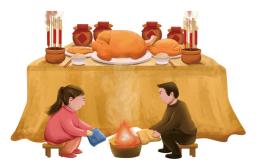
In ancient times, this custom was very prosperous. "Heaven and earth are the foundation of life; The ancestors are the foundation of the class. " It means that heaven and earth are the foundation of life, ancestors are the foundation of our human beings, and ancestor worship is a custom of inheriting filial piety. Due to the different manners and customs in different places, the forms of ancestor worship are also different.
Some went to visit the ancestral graves in the wild, and some went to the ancestral hall to worship their ancestors. Most of them placed their ancestral tablets in the main hall in turn at home to display their offerings, and then the worshippers worshipped in the order of age.
stay up late or all night on New Year’s Eve
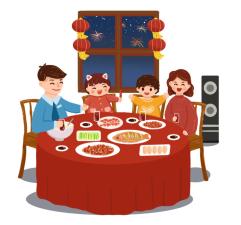
Keeping old age on New Year’s Eve is one of the activities of the annual custom, and the custom of keeping old age has a long history. The folk custom of observing the New Year’s Eve is mainly manifested in the fact that the lights stay on all night, saying "light the New Year’s Eve" or "light the New Year’s Eve". All houses are lit with candles, and even the candles are specially lit under the bed, which is called "wasting the light". It is said that after such lighting, the wealth at home will be enriched in the coming year.
In some places, on New Year’s Eve, the whole family get together, eat New Year’s Eve, light candles or oil lamps, sit around the stove and chat, and keep vigil all night, symbolizing driving away all evil diseases and looking forward to good luck in the new year.
Text finishing: Chen Yuhang
Editor-in-Chief: Chen Yuhang; Editor-in-Chief: Ma Haiwen
Supervision and examination: Hou Yuefeng
Producer: Fu Xing
Chief producer: Zhang Xiaoqi
Original title: "New Year’s Eve |"
Read the original text